
Guitars by Jake
-
Posts
37 -
Joined
-
Last visited
Content Type
Profiles
News and Information
Tutorials
Product Reviews
Supplier Listings
Articles
Guitar Of The Month
Links and Resources
Forums
Gallery
Downloads
Posts posted by Guitars by Jake
-
-
Funny I see this post up. Client just walked out with the bass 5 minutes ago! The new neck worked out perfect, and I think I even changed my method on future builds, because of this experience. (what doesnt kill you only makes you stronger, right!) Honestly the only thing that bugs me now is those block inlays. Not that they were jumping off of the fretboard or anything, but I added some # 10 super glue around the edges, hoping it would soak up a little, just in case. (very happy client by the way.) Maybe I will put up some pics soon.
-
Yeah, Ive used it before, but never for a neck......Ive been getting some wierd requests lately. Guess that comes with custom building. Oh well.
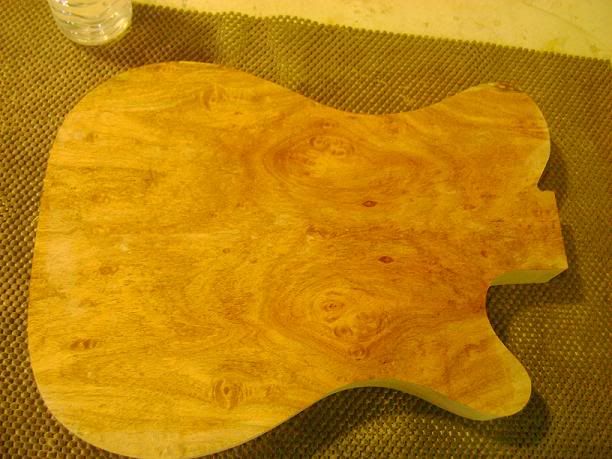
-
Anybody ever use mesquite for a neck? How about a 5 piece with ash stripes. I am sure there will be a weight issue, but with that aside, any opinions on stability, difficulty working,........
-
I managed to get the fret board off the neck using a heat lamp, cost me all of 5 bucks. I decided to replace the neck however, just to be on the safe side, as this was for a client. I too believe it was just a clamping error. This time around, I glued the fretboard on before shaping the neck, and it came out perfect! Only really lost a couple of days, and that was only because of glue dry time. (normally I like to shape the neck a little first, but due to this experience, I think I have a new method.)
-
Thanks guys. Has any one seen black pearl that is really black in color? Thats kinda the thing at this point. I had a long conversation with the client the other night, discussing different options, and so far its either recon stone, ebony, or onyx. Of course I am still researching for ideas. I completely gave up on obsidian at this point, seeing as now the inlay got a little more creative. I really like the idea of black pearl as it is readily available, and I have some experience with mop, and abalone. I just couldnt sell him on any that I found, because it wasnt dark enough.
-
I was just wondering if anyone has tried using obsidian, or anything of that nature forr inlay material. I have a potential client that would like something like that. Maybe block inlays, or something fairly simple. Also, how hard would it be to get it to the right shape? I may have to talk him into black pearl, but I thought I would ask anyway.
-
Drak... As far as being a seasoned luthier, I certainly feel that noone should judge their own merit. So I will not. But on your advice, which I fully agree, I don't plan on using this board to create a series of heavy guitars. I WILL buid one, just cause I cant help it. The rest of the wood will go to chambered bodies, or neck splices and the such.( nothing goes to waste in my shop!) But Ill tell you one thing, My common sense tells me that this is some heavy stuff! (Might make a great table top!)
-
Has the wood been seasoned properly? The additional weight might be excess water? I'm not sure how much weight mahogany loses from green to seasoned, although I would be interested in hearing if this a factor. I've always found "African mahogany" (Sapele?) to be light, so this is interesting from my perspective.
I have used alot of african mahogony, and have seen some really light stuff, and some really heavy stuff. This one is a monster! I got it from the same place I have been getting my wood from for quite some time. The guy I work for has been getting it there too. Never had an issue with unseasoned lumber. I might know someone with a moisture meter though.....
-
Most of the guitars I build using that shape and setup are in the 7, or 8 lb range. I have made a 10 lb guitar, but it had a marble wood back. I fear these guitars I am going to start soon, will all be around that weight if I dont do something like chamber them, but I dont do that because of the way I carve them. Maybe its time for a new model!
-
I recently purchased a large board of african mahogony to build some solid 1 piece body guitars. When loading the board into the car, I noticed it was fairly heavy. I figured once the body blanks were cut out that they wouldnt be too bad. Well, I cut one out today, and weighed it. It came in at about 8 lbs! I still have to shape and route it, but I dont think these will be light weight guitars. This is some seriously dense wood! Hopefully that translates well into good tone. I know some people like a more solid feeling guitar, but the majority will want lighter instruments. any body here build/play heavy guitars?
-
Thanks everybody. Yeah, Ive never come across nothing like this, and I have built quite a few necks using the exact same method. I guess I either missed something along the way, or the wood just had a bad attitude. Jaden, I think thats exactly whats going to happen. I am considering heatlamps however. Luckily I have just enough wood left over for the headstock veneer!
-
The neck is in mid-build. As far as relief goes, If I max out the truss rod, and check with straightedge, I still have a bit of a back bow. sort of a hump in the middle section.
-
I am buiding a four string bass, and after gluing up the fretboard, I ended up with a bad back bow. I am using a double acting truss rod, but I pretty much max it out trying to correct it. Also, I dont want this bass going out to the world and suddenly falling apart due to the fact that it is under stress from the truss rod. I have made many necks this way, and never had anything this bad happen. Should I steam off the fret board? And if so, what is the best technique/tools. I have seen it done, but Im kinda nervous about trying it myself.
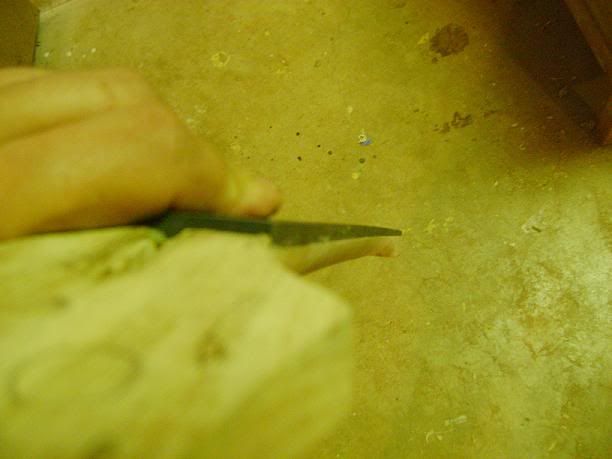
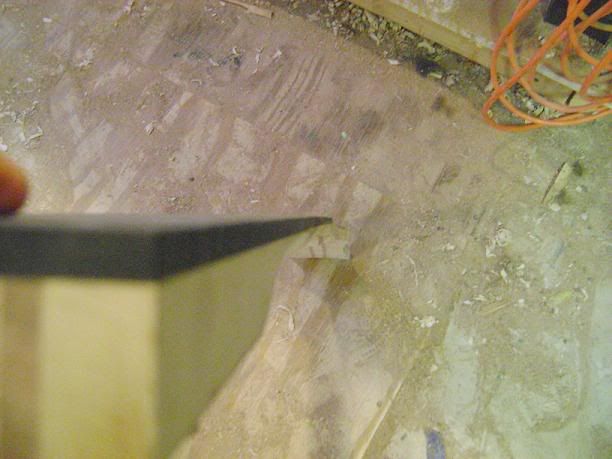
I see you haven't put the frets in yet. I would just level the board with a leveling block.
I have thought about that, but I have some rather nice block inlays in there. The fretboard is probably thick enough, but I am not looking forward to sanding through, and replacing inlays. I am considering taking it apart, and salvaging the fretboard and truss rod, but making a new neck blank and starting fresh.
-
I am buiding a four string bass, and after gluing up the fretboard, I ended up with a bad back bow. I am using a double acting truss rod, but I pretty much max it out trying to correct it. Also, I dont want this bass going out to the world and suddenly falling apart due to the fact that it is under stress from the truss rod. I have made many necks this way, and never had anything this bad happen. Should I steam off the fret board? And if so, what is the best technique/tools. I have seen it done, but Im kinda nervous about trying it myself.


-
I usualy do kind of a pre setup before I do the frets, then I level them, crown them, and then use sand paper starting going from 220-320-400-600-800-1000 after which I use steel wool, and then some metal polish. Takes a bit of time, but they shine when done. I have tried different ways to speed up the process, (not on clients guitars) and I was never really happy with the outcome.
-
A friend of mine loaned me a Randall rh300 Valve dynamic head, and I was wondering if anybody was familiar with it. I havent been playing on it that long, but I am having trouble getting the sound I am looking for out of it. (Think heavy, but not too processed sounding,the band Clutch comes to mind.) I know tubes are the way to go, but this may be the affordable rout, if I can get it to do what I want. Anyone who has played on this, or similar amps, I would like to hear your opinions. Thanks, Jake.
-
I know ive posted it before, but with all of the black and white ebony floating around here, I just found it appropriate......
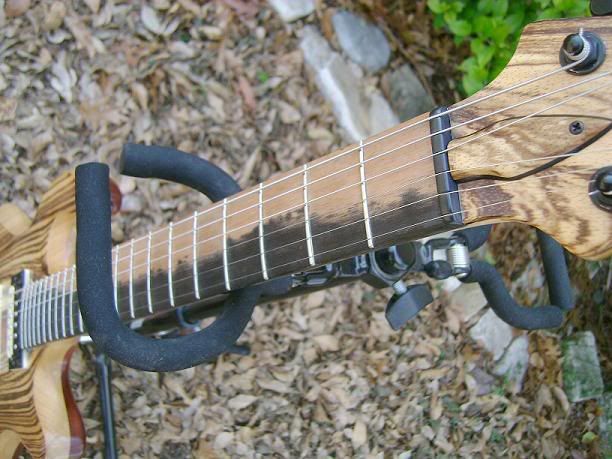
Also, I agree about no inlays, but..To each his own.
-
First...you should realize that the p-bass pickup is humbucking...the pair of coils are rwrp.
You could reverse them ok...but there maybe a phase difference with the single coil jazz pickup...however, reversing the wires on either (but not both) will fix any phase issues there.
I am not sure where a "sweet spot" would be on a bass...mine have had different locations...generally though, you don't want to move too far towards the neck as you want a fair bit of definition with a bass's low frequencies to avoid a "muddy" sound.
I find a passive tone control adequate to take out high frequencies for a fatter sound on bass and on a multi-pickup bass, a rotary mix control is often more useful than a selector
hope that helps a little
pete
Thanks psw. I didnt realize that the p bass was humbucking. I am generally a guitar builder, And have built very few complete basses. So, all I have to do is reverse the wires on a pickup, and Im back to normal? thats cool. It would work alot better with my layout. (interesting thumbrest design, pickups are in the way.) I was just thinking a little farther up from the bridge than normal. and I was going to wire it quite basic. each pickup gets its own volume control, and there will be a mid and bass tone control. Thanks aain for the tips.
-
I am building a 4 string bass guitar, and I am setting it up for p-j (Precison/jazz) pickups. I am uzing dmarzio pickups, and I am wondering... On the p bass pickups, does it make a difference if I were to flip the routing template over, so that the pickups are in the opposite configuration? The jazz pup will still be in the bridge position, and everything will be moved a little more towards the middle, (still experimenting....looking for sweet spot) Will I throw the pickups out of phase? The main reason I would do this is cosmetics. I am building in a thumbrest, and the pickups would look better with it. Oh yeah, they will be passive, and I believe they will be single coil. Any input greatly appreciated.
-
Sorry about the pics, Guess im not too skilled with a camera! Im learning, though! I had to vote for Scotty d. I like the Idea of putting a nice piece of wood on the back, instead of just not worrying about it because its the back! Big d would have been my second choice. (Guess I got a thing for nice burls!) All were great, making it a tough decision. There is definately some talent here!
-
Has any one done a block inlay job on a 34" scale bass, using a les paul (guitar size) marker set? I am doing it on an ebony fretboard, with white m.o.p inlay material. Granted they will be smaller, and I will have to cut one for the 24th fret, I was just wondering if any one has seen or done anything like this. I think it might work, and yes, I did order guitar inlays on accident. Just trying to make the best of things. Any response apreciated.
-
Guitars by Jake please add some info on the guitar you have submitted for the GOTM it deserves it thanx
Sorry, I noticed that the other day. Everyone else put up info on their guitar, but I guess Im learning forum etiquite still. I will start reading directions more thuroughly from here on out! I will put it up on that page, if its ok.
-
I know I am only a few days into being on this forum, but i thought I would throw this one in. Im kinda proud of it, so I figured...What would it hurt? It is the guitar I built to commemorate my 1st year as an actual buiseness. Call it the "Zebra from hell" if you want. Nothing else comes to mind! Specs Are.... 3 piece laminated body,(Zebrawood top, Ash core, Mahogony back) Cocobolo accent stripe, 5 piece neck, maple with mahogoy stripes, Two tone Ebony fretboard. The Pickups are hand -wound by me, (11.20k Neck, and 12k ohm bridge) Controls are Master volume, Two master tones, push-pull knob for coil split,orange drop caps,Schaller bridge, Grover mini roto matics for the tuners, 25" scale, 12" radius Graphite nut Comfort carved back, and blended neck heel.
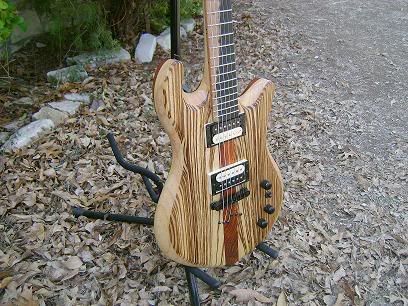

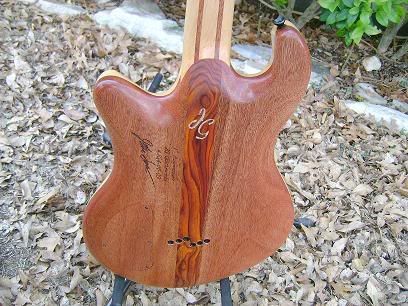
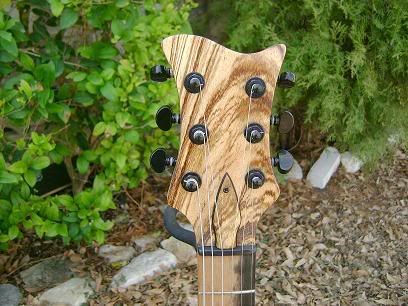
-
This is nothing new. Google "Ken Smith" custom Basses. Piezo and a bone saddle bridge.
"New" is getting harder and harder to come by these days. At best I am trying to put my own spin on great designs, (of course with due respect to their creator) and maybe come up with a few of my own innovations along the way. If this can be achieved with some respect earned at the end, then I have succeeded. If I wanted to come up with a completely different instrument, I wouldnt be building guitars! But if its copyrighted, or something, I wont touch it.

Tele Inspired Build With Mesquite And Cherry
in In Progress and Finished Work
Posted · Edited by Guitars by Jake
So I was comissioned to build this guitar by a friend, and I liked the idea so much I decided to make two! Only one is pictured here, I have the neck for the other halfway done, and I still gotta make one more body blank, but this should give the idea of what its gonna turn out like. I still need to perfect the pickguard design, as it will be (hopefully) made out of birdseye maple. Im sure it wont come out sounding anything like the guitar that inspired it, but accurate recreation is not my goal. Im hoping it will sound good in its own way!